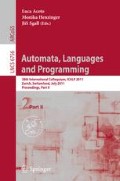Abstract
We investigate how collusion affects the social cost in atomic splittable routing games. Suppose that players form coalitions and each coalition behaves as if it were a single player controlling all the flows of its participants. It may be tempting to conjecture that the social cost would be lower after collusion, since there would be more coordination among the players. We construct examples to show that this conjecture is not true. These examples motivates the question: under what conditions would the social cost of the post-collusion equilibrium be bounded by the social cost of the pre-collusion equilibrium?
We show that if (i) the network is “well-designed” (satisfying a natural condition), and (ii) the delay functions are affine, then collusion is always beneficial for the social cost in the Nash equilibria. On the other hand, if either of the above conditions is unsatisfied, collusion can worsen the social cost. Our main technique is a novel flow-augmenting algorithm to build Nash equilibria.
Research supported by an Alexander von Humboldt fellowship.
Access this chapter
Tax calculation will be finalised at checkout
Purchases are for personal use only
Preview
Unable to display preview. Download preview PDF.
References
Altman, E., Basar, T., Jimenez, T., Shimkin, N.: Competitive routing in networks with polynomial costs. IEEE Transactions on Automatic Control 47(1), 92–96 (2002)
Andelman, N., Feldman, M., Mansour, Y.: Strong price of anarchy. In: SODA, pp. 189–198 (2007)
Aumann, R.: Acceptable points in geneeral cooperative n-person games. Contributions to the Theory of Games 4 (1959)
Bhaskar, U., Fleischer, L., Huang, C.-C.: The price of collusion in series-parallel networks. In: Eisenbrand, F., Shepherd, F.B. (eds.) IPCO 2010. LNCS, vol. 6080, pp. 313–326. Springer, Heidelberg (2010)
Cominetti, R., Correa, J., Stier-Moses, N.E.: The impact of oligopolistic competition in networks. Operations Research 57(6), 1421–1437 (2009)
Fotakis, D., Kontogiannis, S., Spirakis, P.: Atomic congestion games among coalitions. ACM Transactions on Algorithms 4(4) (2008)
Harks, T.: Stackelberg strategies and collusion in network games with splittable flow. In: Bampis, E., Skutella, M. (eds.) WAOA 2008. LNCS, vol. 5426, pp. 133–146. Springer, Heidelberg (2009)
Hayrapetyan, A., Tardos, E., Wexler, T.: The effect of collusion in congestion games. In: STOC, pp. 89–98 (2006)
Huang, C.-C.: The price of collusion in series-parallel networks, Technical Report 238, Humboldt-Universität zu Berlin, Institut für Informatik (2011)
Koutsoupias, E., Papadimitriou, C.: Worst-case equilibria. In: Meinel, C., Tison, S. (eds.) STACS 1999. LNCS, vol. 1563, pp. 404–413. Springer, Heidelberg (1999)
Orda, A., Rom, R., Shimkin, N.: Competitive routing in multiuser communication networks. IEEE/ACM Transactions on Networking 1(5), 510–521 (1993)
Roughgarden, T.: Selfish routing with atomic players. In: SODA, pp. 1184–1185 (2005)
Roughgarden, T., Schoppmann, F.: Local smoothness and the price of anarchy in atomic splittable congestion game. In: SODA, pp. 255–267 (2011)
Roughgarden, T., Tardos, E.: How bad is selfish routing? Journal of the ACM 49(2), 236–259 (2002)
Wardrop, J.G.: Some theoretical aspects of road traffic research. In: Proc. Institute of Civil Engineers, Pt. II, vol. 1, pp. 325–378 (1952)
Author information
Authors and Affiliations
Editor information
Editors and Affiliations
Rights and permissions
Copyright information
© 2011 Springer-Verlag Berlin Heidelberg
About this paper
Cite this paper
Huang, CC. (2011). Collusion in Atomic Splittable Routing Games. In: Aceto, L., Henzinger, M., Sgall, J. (eds) Automata, Languages and Programming. ICALP 2011. Lecture Notes in Computer Science, vol 6756. Springer, Berlin, Heidelberg. https://doi.org/10.1007/978-3-642-22012-8_45
Download citation
DOI: https://doi.org/10.1007/978-3-642-22012-8_45
Publisher Name: Springer, Berlin, Heidelberg
Print ISBN: 978-3-642-22011-1
Online ISBN: 978-3-642-22012-8
eBook Packages: Computer ScienceComputer Science (R0)

